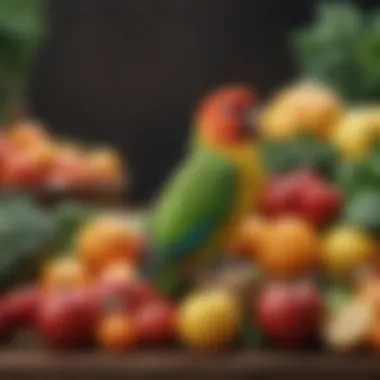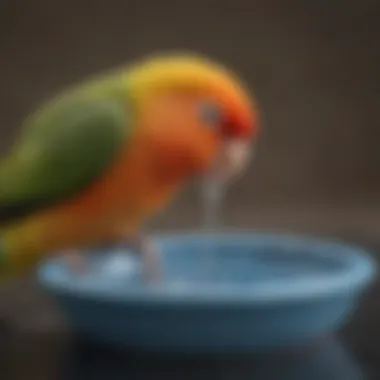Unlocking the Secrets of Lovebird Nutrition for Vibrant Health and Longevity


Animal Species Profile
Lovebirds, a species of small parrots known for their vibrant plumage and affectionate nature, captivate the hearts of many avian enthusiasts. These petite birds flaunt a combination of colors ranging from bright yellows, greens, to rich blues, with distinct feather patterns that set them apart in the avian world. Originating from the African continent, lovebirds thrive in diverse habitats such as woodlands, savannas, and dry scrub. Their social nature often leads them to flock together, showcasing their playful interactions and chirpy communications.
Unique Facts & Trivia
Apart from their enchanting appearance and sociable demeanor, there exist several intriguing aspects about lovebirds that add to their charm. These petite avians have a strong pair bond, often seen cuddling and preening each other affectionately. They are also known for their exceptionally loud calls that can carry for long distances, serving as a means of communication and territory marking. Moreover, lovebirds possess robust beaks that aid them in chewing and cracking seeds, showcasing their remarkable adaptability in consuming varied diets.
Pet Care & Tips
For aspiring lovebird companions, understanding the nuances of caring for these delightful avians is paramount to ensuring their well-being. Selecting a suitable lovebird that aligns with your lifestyle and living space is the first step towards a fulfilling companionship. Basic care requirements include providing a spacious cage equipped with toys and perches for mental stimulation, along with a balanced diet comprising quality pellets, fresh fruits, and vegetables. Regular veterinary check-ups, exercise opportunities, and positive reinforcement training techniques contribute towards fostering a harmonious relationship and nurturing a contented lovebird.
Introduction
To embark on this journey of optimizing your lovebird's diet, we must first grasp the significance of nutrition in these enchanting creatures' lives. Lovebirds, like humans, require a well-balanced diet to thrive, packed with all the essential nutrients necessary for sustaining their health. From proteins to vitamins, minerals, healthy fats, and hydration, each component plays a pivotal role in maintaining every aspect of a lovebird's well-being. Therefore, by delving into each element meticulously, we can uncover the keys to enhancing their vitality and ensuring a fulfilling life for these beloved pets.
As we progress through this article, we will explore the intricacies of lovebirds' nutritional needs in depth. From the protein requirements essential for muscle strength and growth to the vital role of vitamins and minerals in supporting various bodily functions, we will navigate through a comprehensive guide that addresses every facet of a lovebird's diet. Additionally, we will shed light on the importance of incorporating healthy fats into their meals and the benefits they offer for overall health. By building a solid foundation of understanding around these key nutritional aspects, pet owners can make informed decisions that positively impact their lovebirds' health.
Stay tuned as we uncover the secrets to building a balanced diet specifically catered to meet your lovebird's individual needs. From evaluating the pros and cons of seed mixes versus pellets to the significance of fresh fruits, vegetables, grains, and legumes in their diet, we will provide practical insights to help you make informed choices. By striking the right balance between different food groups, you can ensure that your lovebird receives a diverse array of nutrients necessary for optimal health and vitality. Let's embark on this nutritional journey together and pave the way for a healthier and happier life for your avian companion.


Understanding Lovebirds' Nutritional Needs
In the realm of avian care, comprehending lovebirds' nutritional requirements holds paramount significance. Lovebirds, with their striking plumage and endearing demeanor, necessitate a diet that caters to their unique physiology. By delving into the depths of understanding lovebirds' nutritional needs, avian enthusiasts embark on a journey to optimize their beloved pets' overall health and well-being. This section delves into the intricate balance of proteins, vitamins, minerals, and healthy fats essential for sustaining lovebirds' vitality and augmenting their longevity.
Protein Requirements
Delving into the realm of protein requirements for lovebirds unveils a critical aspect of their dietary regimen. Proteins stand as pivotal building blocks for these captivating avian companions, contributing to muscle development, feather health, and overall metabolic functions. Devising a diet rich in quality proteins ensures the holistic wellness of lovebirds, bolstering their energy levels and fortifying their immune systems. This section navigates through the significance of incorporating adequate protein sources into lovebirds' daily sustenance, emphasizing the symbiotic relationship between protein intake and their thriving existence.
Essential Vitamins and Minerals
Essential vitamins and minerals form the bedrock of a nutritious diet tailored for lovebirds. These micronutrients play a vital role in diverse physiological processes, spanning from immune function to cognitive well-being. Unraveling the intricate tapestry of vitamins like Vitamin A, B complex, and Vitamin C alongside minerals such as calcium, phosphorus, and zinc illuminates the path to optimal health for lovebirds. Exploring the nuanced interplay between vitamins and minerals expounds on the criticality of maintaining a well-rounded diet to avert deficiencies and foster vitality in these charismatic avian companions.
Healthy Fats for Lovebirds
Nurturing lovebirds' health extends beyond proteins and micronutrients to encompass healthy fats essential for their well-being. Omega-3 and Omega-6 fatty acids assume a pivotal role in supporting lovebirds' cardiovascular function, cognitive acuity, and plumage quality. Incorporating sources of healthy fats like nuts, seeds, and oily fish into their diet enriches their nutritional intake, elevating their overall health and luster. This section delves into the meticulous balance of healthy fats required for lovebirds, elucidating the benefits of integrating these essential nutrients into their dietary regime.
Building a Balanced Diet
In this section, we delve into the crucial aspect of building a balanced diet for lovebirds, emphasizing its paramount significance in optimizing their overall health and well-being. A well-rounded diet plays a pivotal role in promoting vitality and longevity in these enchanting avian companions. By carefully selecting the right mix of nutrients, lovebird owners can ensure that their feathery friends receive all the essential components necessary for a healthy and fulfilling life. Factors such as protein content, vitamin and mineral balance, and the inclusion of healthy fats are vital considerations when formulating a diet plan for lovebirds.
Seed Mixes vs. Pellets


Advantages of Seed Mixes
Exploring the virtues of seed mixes unveils a world of nutritional benefits for lovebirds. With their diverse array of seeds, these mixes offer a varied and interesting diet that appeals to the discerning avian palate. The richness of textures and flavors in seed mixes stimulates foraging behaviors, providing both physical and mental enrichment. However, it is essential to note that seed mixes can be high in fat content, requiring moderation to prevent obesity and related health issues. Despite this limitation, seed mixes remain a popular choice for lovebird owners seeking to provide a diet that mirrors their pets' natural feeding habits, fostering a sense of authenticity in their nutritional intake.
Benefits of Pellets
Conversely, pellets present a convenient and nutritionally balanced alternative to seed mixes. Formulated to contain essential vitamins, minerals, and other nutrients, pellets offer a controlled diet option that ensures lovebirds receive all the necessary dietary components in each bite. The uniform composition of pellets eliminates selective eating habits, reducing the risk of nutrient deficiencies. While pellets lack the variety of textures and flavors found in seed mixes, they streamline the feeding process and simplify nutritional management. Lovebird owners gravitate towards pellets for their ease of use and dietary consistency, appreciating the convenience and reliability they offer in optimizing their pets' nutritional intake.
Fresh Fruits and Vegetables
To provide a wholesome and diverse diet for lovebirds, incorporating fresh fruits and vegetables is paramount. These natural foods offer a wealth of essential vitamins, minerals, and antioxidants that contribute to overall health and immune function in lovebirds. Including a variety of fruits such as apples, berries, and citrus fruits, along with leafy greens like spinach and kale, enriches the diet with a spectrum of nutrients. Lovebirds relish the freshness and vibrant colors of these produce items, making mealtime an enjoyable and enriching experience. Careful selection and preparation of fruits and vegetables will ensure that lovebirds receive a well-rounded diet that supports their physiological needs.
Incorporating Grains and Legumes
Incorporating grains and legumes into a lovebird's diet provides additional sources of essential nutrients, fiber, and energy. Grains like rice, quinoa, and whole wheat, as well as legumes such as lentils and chickpeas, offer diverse dietary benefits for lovebirds. These foods supply complex carbohydrates for sustained energy levels, along with dietary fiber for digestive health. Furthermore, grains and legumes contribute to the overall dietary diversity that is crucial for meeting lovebirds' nutritional requirements. By introducing a variety of grains and legumes in moderation, lovebird owners can enhance the nutritional profile of their pets' diet, supporting their well-being and vitality.
Hydration and Dietary Supplements
In the realm of lovebird care, one aspect that stands as a cornerstone of their well-being is Hydration and Dietary Supplements. These elements play a pivotal role in ensuring your feathered companion maintains optimal health and vitality. Adequate hydration is crucial for lovebirds as it supports various bodily functions, aids in digestion, and helps regulate body temperature. Without sufficient water intake, lovebirds can face dehydration, leading to a range of health issues. Introducing dietary supplements can further enhance their nutritional intake, filling any potential gaps that may exist in their diet.


When delving into the realm of avian care, understanding the significance of freshwater emerges as a fundamental factor in promoting your lovebird’s health. Freshwater serves as a life source for these charming creatures, facilitating proper digestion, nutrient absorption, and overall well-being. Lovebirds need access to clean water at all times, ensuring they stay adequately hydrated. Monitor your pet's water intake to spot any declines, which could indicate underlying health concerns such as illness or dehydration.
As lovebirds require specific nutrients to thrive, supplementing their diet with essential elements such as Calcium and Vitamin D becomes paramount. These nutrients contribute significantly to bone health, muscular function, and overall metabolic processes. Ensuring adequate levels of Calcium and Vitamin D can prevent deficiencies that might impact your pet's well-being. However, it is crucial to consult avian experts or veterinarians before introducing supplements to your lovebird's diet, as improper dosages can lead to adverse effects. By incorporating these supplements thoughtfully, you can bolster your pet's health and vitality, promoting a vibrant and lively companion by your side.
Avoiding Harmful Foods and Toxins
One of the primary reasons why avoiding harmful foods and toxins is pivotal in enhancing your lovebird's overall health is the detrimental impact these substances can have on their digestion and immune system. Lovebirds, being sensitive creatures, can suffer greatly from ingesting foods that are toxic to them. Substances like avocado, chocolate, alcohol, and foods high in salt or sugar can wreak havoc on a lovebird's delicate digestive tract, leading to grave health repercussions. Therefore, a vigilant approach to eliminating such harmful items from your pet's diet is crucial for their longevity and vitality.
Furthermore, toxins present in certain fruits, vegetables, and household items can pose a significant threat to your lovebird's well-being. It is imperative to meticulously research and understand which foods are safe and which are harmful for your avian companion. For instance, some houseplants like philodendron, poinsettia, and oleander are poisonous to birds and should be kept well out of reach. By being diligent in identifying and excluding these toxic elements from your lovebird's environment, you can prevent unnecessary health crises and nurture a safe living space for your beloved pet.
In the dynamic landscape of pet care and wellness, education and awareness play a pivotal role in ensuring the long-term health and happiness of your lovebird. Equipping yourself with knowledge about harmful foods and toxins empowers you to make informed decisions regarding your pet's diet and living conditions. By prioritizing caution and attentiveness in this regard, you manifest your commitment to providing the best possible care for your feathered companion. Remember, a proactive approach to avoiding harmful substances is a cornerstone of effective lovebird care, enriching both your pet's life and your bond with them.
Monitoring Your Lovebird's Diet
In the realm of avian care, vigilantly overseeing your lovebird's dietary intake plays a pivotal role in ensuring their overall health and well-being. Understanding the significance of monitoring your lovebird's diet encompasses a spectrum of benefits that resonate deeply with responsible pet ownership. By keeping a keen eye on their nutrition, you can swiftly detect any deviations from the norm, thereby mitigating potential health issues proactively. This proactive approach not only safeguards your feathered companion from ailments but also fosters a deeper bond as you demonstrate unwavering commitment to their welfare.
Identifying signs of nutritional deficiencies in your lovebird requires a discerning eye attuned to subtle changes in behavior, appearance, or physical cues. Manifestations of deficiencies such as lethargy, dull plumage, or changes in eating patterns serve as red flags that necessitate prompt attention. As a conscientious caregiver, familiarizing yourself with these indicators equips you with the knowledge to address underlying issues promptly, thereby averting potentially serious health complications. Prioritizing regular health assessments and consulting avian specialists can further fortify your ability to provide tailored care that meets your lovebird's unique nutritional requirements.
When it comes to managing your lovebird's weight, a delicate balance must be struck to uphold their well-being and vitality. Implementing portion control strategies and promoting physical activity through interactive toys and ample flying space are foundational to cultivating a healthy weight. Moreover, incorporating a diverse array of nutrient-rich foods while moderating fatty or sugary treats contributes to maintaining optimal weight levels. Viewing weight management as a holistic endeavor that encompasses both diet and exercise underscores the commitment required to sustain your lovebird's quality of life and longevity.
Conclusion
As the trove of knowledge unraveled, the conclusion unravels a tapestry of crucial insights and directives. It stands as a testament to the dedication required in tailoring a lovebird's diet to align with their biological predispositions. Central to this culmination is the emphasis on achieving a delicate equilibrium between proteins, vitamins, minerals, fats, and other vital nutrients crucial for lovebird sustenance. Highlighting the significance of striking this balance, the conclusion serves as a compass navigating owners through the complex terrain of avian dietary needs.
Furthermore, the conclusion resonates with a resonant reminder of the vital role diet plays in optimizing a lovebird's health trajectory. By elaborating on the palpable benefits reaped from a well-crafted diet regimen, the conclusion bolsters the argument for an attentive and discerning dietary approach. It accentuates the cascading positive effects a tailored diet can instigate, fostering vitality, longevity, and overall well-being in these captivating feathered companions.
In essence, the conclusion of this article transcends mere summary; it metamorphoses into a catalyst for action and reflection. It urges pet owners to internalize the manifold learnings encapsulated within the discourse on optimizing lovebird nutrition. Ultimately, the conclusion stands as a testament to the symbiotic relationship between informed dietary choices and the flourishing health of our beloved avian cohorts.







